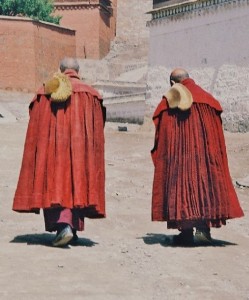~~Life is suffering.
~~Suffering originates in desire.
~~Desire may be extinguished.
~~There is a path to this end.
~~Sakyamunni
~~Four Noble Truths
It has been some days since I’ve written about my family. I stop writing and run around doing the this and that of my life in China, making excuses why I can’t write more. I nurse another cold. I soak my uncooperative knee and hip with ginger oil and rub the lot with Red Flower Oil before going to bed and can forget about writing. I am feeling my way along my own Great Wall that locks me out of my inner-world. Then, I find a chink on a lazy Sunday morning, the fog outside so thick I can’t even see the mountains. On the other side of this crack in the wall, there is no fog. It is raining instead and Tibet opens itself up to me.
I 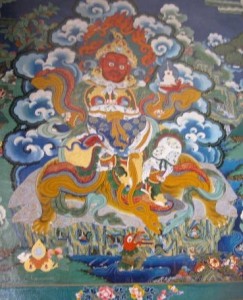 am standing on the Linghor, the outer pilgrimage circuit in Lhasa. I can feel my feet slipping on the wet, black cobblestones underneath. I don’t know if my feet are slipping or the cobblestones are moving beneath them so much am I in a dream world so high as Lhasa… sharp and quick my breath. I’ve walked in the Linghor without really taking it in. My memory of the Ramoche Temple, sister of the most sacred place, the Jokhang, is already fading as I stand there with crystal drops gathering and then dripping off the points of my umbrella. Lhasa is overwhelming in its devotion… incense burners everywhere crackling with juniper branches… pilgrims… dancing gods with forbidding faces… peaceful Sakyamunni’s. Something so old and buried here deeply defies my mind’s ability to understand any of it. The Tibetan guide tries to explain, but it is so complicated it is all bones with no flesh… no color. Yet, color and light are all around me in the frescoes and glow of the yak butter lamps. The Tibetans are real in their traditional clothing, their chanting and tasks of daily life.
am standing on the Linghor, the outer pilgrimage circuit in Lhasa. I can feel my feet slipping on the wet, black cobblestones underneath. I don’t know if my feet are slipping or the cobblestones are moving beneath them so much am I in a dream world so high as Lhasa… sharp and quick my breath. I’ve walked in the Linghor without really taking it in. My memory of the Ramoche Temple, sister of the most sacred place, the Jokhang, is already fading as I stand there with crystal drops gathering and then dripping off the points of my umbrella. Lhasa is overwhelming in its devotion… incense burners everywhere crackling with juniper branches… pilgrims… dancing gods with forbidding faces… peaceful Sakyamunni’s. Something so old and buried here deeply defies my mind’s ability to understand any of it. The Tibetan guide tries to explain, but it is so complicated it is all bones with no flesh… no color. Yet, color and light are all around me in the frescoes and glow of the yak butter lamps. The Tibetans are real in their traditional clothing, their chanting and tasks of daily life.
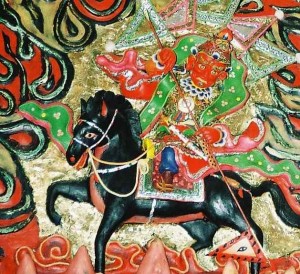 We’ve stopped at Lho Rigsum Lhakhang, a chapel not well known to outsiders in this neighborhood of crannies and warrens. There is an expectant crowd of Tibetan pilgrims waiting to do kora… the ritual of circling three times clockwise. I want to understand the pilgrims I see, but I don’t know where to start. So, I begin with shy questions and tentative comments. I tell the guide I really want to understand Tibetan Buddhism, but that I am frustrated because I don’t know how… want to participate but don’t know if it is permitted… feel I would understand more by doing rather than standing there gaping. He smiles peacefully without judgment and tells me a story. There is a place in Tibet, he says, where pigs
We’ve stopped at Lho Rigsum Lhakhang, a chapel not well known to outsiders in this neighborhood of crannies and warrens. There is an expectant crowd of Tibetan pilgrims waiting to do kora… the ritual of circling three times clockwise. I want to understand the pilgrims I see, but I don’t know where to start. So, I begin with shy questions and tentative comments. I tell the guide I really want to understand Tibetan Buddhism, but that I am frustrated because I don’t know how… want to participate but don’t know if it is permitted… feel I would understand more by doing rather than standing there gaping. He smiles peacefully without judgment and tells me a story. There is a place in Tibet, he says, where pigs root their way around a chorten, the last resting place of the ashes of the lamas. He tells me that they, in their dumb beast mind go round and round, an act of their karma. We both laugh at this story, but what I see in his eyes is, “You can start where you are. Can you do any less?”
root their way around a chorten, the last resting place of the ashes of the lamas. He tells me that they, in their dumb beast mind go round and round, an act of their karma. We both laugh at this story, but what I see in his eyes is, “You can start where you are. Can you do any less?”
I buy the barley flour 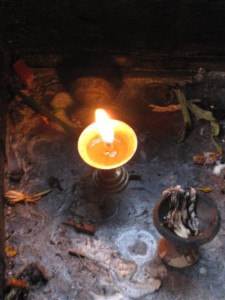 and the wheat. I throw it three times on the xiangkang… the incense burner… once to the top, once to the middle…once to the bottom…and, then I am on my way into the Lho Rigsum Lhakhang by myself to do kora. The passageway is narrow and the fragrance from the yak butter lamps is overpowering. They flicker eerily… full of soft light that reflect their glow onto me. I follow an old woman down the dark passage to the altar of Tsempame with the four Bodhisattvas… Tsempame, Buddha of “boundless life.” I feel no sense of being carried on into religious fervor… nor overcome with what I see. It is as if I am standing on a fulcrum exactly balanced in the sense of being alive without trappings… without happenings… without any sadness or happiness I have had in the past. I see nothing ahead. I see nothing behind… a state that recognizes the boundles
and the wheat. I throw it three times on the xiangkang… the incense burner… once to the top, once to the middle…once to the bottom…and, then I am on my way into the Lho Rigsum Lhakhang by myself to do kora. The passageway is narrow and the fragrance from the yak butter lamps is overpowering. They flicker eerily… full of soft light that reflect their glow onto me. I follow an old woman down the dark passage to the altar of Tsempame with the four Bodhisattvas… Tsempame, Buddha of “boundless life.” I feel no sense of being carried on into religious fervor… nor overcome with what I see. It is as if I am standing on a fulcrum exactly balanced in the sense of being alive without trappings… without happenings… without any sadness or happiness I have had in the past. I see nothing ahead. I see nothing behind… a state that recognizes the boundles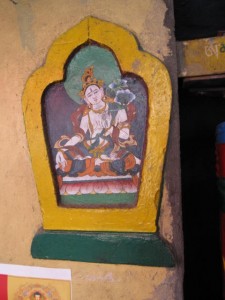 sness of my life and everyone I know… the abundant nature of fleeting moments that cut through the superficial ordering of lives. I recollect all of what lives outside of this moment as well… the striving to amass things deemed necessary… the frenetic movements made to cover up the fear of dealing with who we really are and what we have constructed for others to see… the tacit acceptance of what others have convinced us that we should be that has nothing to do with this moment of stasis, of calmness without desire… transcending all that is imperfect… embracing all that we would ever need to be. One need not go to Lhasa to find such a moment. But it is in Lhasa that the moment is deepened with a clarity and sureness of foot I’ve not had before.
sness of my life and everyone I know… the abundant nature of fleeting moments that cut through the superficial ordering of lives. I recollect all of what lives outside of this moment as well… the striving to amass things deemed necessary… the frenetic movements made to cover up the fear of dealing with who we really are and what we have constructed for others to see… the tacit acceptance of what others have convinced us that we should be that has nothing to do with this moment of stasis, of calmness without desire… transcending all that is imperfect… embracing all that we would ever need to be. One need not go to Lhasa to find such a moment. But it is in Lhasa that the moment is deepened with a clarity and sureness of foot I’ve not had before.
 I will practice this moment over and over again after that in the dust… next to garbage dumps and the open sewer…under a blue sky next to a river until it is as natural as awakening… tolerant of foibles and conscious of strength found in humility and letting go. I will do kora in Buddhist temples I visit. I will light candles in churches… burn incense… kneel in cathedrals… tie on my head scarf and remove my shoes in mosques. I will be in these places, but not of them. I will find this moment in their softly lit beauty but in the ugliness of the sewer, too… in what is different and still the same. I realize I’ve moved away from subscribing to a faith that has a name. I will never just feel that “Jesus saves”.. .or that
I will practice this moment over and over again after that in the dust… next to garbage dumps and the open sewer…under a blue sky next to a river until it is as natural as awakening… tolerant of foibles and conscious of strength found in humility and letting go. I will do kora in Buddhist temples I visit. I will light candles in churches… burn incense… kneel in cathedrals… tie on my head scarf and remove my shoes in mosques. I will be in these places, but not of them. I will find this moment in their softly lit beauty but in the ugliness of the sewer, too… in what is different and still the same. I realize I’ve moved away from subscribing to a faith that has a name. I will never just feel that “Jesus saves”.. .or that 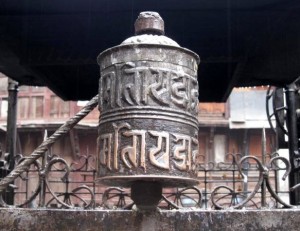 “There is no God, but Allah.” For me, it is the same moment we all revolve around… long for… no matter what the faith. I will end up feeling that doctrine degenerating into dogma is a desire unto itself that causes suffering… an impossible standard for people to follow that also causes wars… a dulling of the desire for anything but superficial knowledge… but mostly I won’t “believe” as has been proscribed, because I know it will keep me from the moment of connection, this act of faith without name, where I am simply content just in the knowledge of who, without anything, I am… who, without anything, we all are. Thus, a journey of another sort begins for me, and I go heeding Lao Tsu’s admonition that if I can let go of what I am, I will become what I still might be.
“There is no God, but Allah.” For me, it is the same moment we all revolve around… long for… no matter what the faith. I will end up feeling that doctrine degenerating into dogma is a desire unto itself that causes suffering… an impossible standard for people to follow that also causes wars… a dulling of the desire for anything but superficial knowledge… but mostly I won’t “believe” as has been proscribed, because I know it will keep me from the moment of connection, this act of faith without name, where I am simply content just in the knowledge of who, without anything, I am… who, without anything, we all are. Thus, a journey of another sort begins for me, and I go heeding Lao Tsu’s admonition that if I can let go of what I am, I will become what I still might be.
 I will be thinking these thoughts one year later on my first day at the Lebrang Monastery in Gansu Province before meeting the Tibetan women and remembering my family… before the horse with the prayer flags and my mother. I will be sitting on the dusty floor in my bare feet with my back against the prayer hall wall. The hall is huge and the rows of monks sit cross-legged on cushions facing each other chanting quietly. Tibetans will come in and bow three times on the worn floor and throw slips of paper with their requests toward the monks. The monks will read the prayers, wave them on into the air around us.
I will be thinking these thoughts one year later on my first day at the Lebrang Monastery in Gansu Province before meeting the Tibetan women and remembering my family… before the horse with the prayer flags and my mother. I will be sitting on the dusty floor in my bare feet with my back against the prayer hall wall. The hall is huge and the rows of monks sit cross-legged on cushions facing each other chanting quietly. Tibetans will come in and bow three times on the worn floor and throw slips of paper with their requests toward the monks. The monks will read the prayers, wave them on into the air around us.  They will chant over the prayer and then throw it to the next row. The monks are full of mirth and good humor and I sit there for over an hour taking them all in. It makes what I want to do much easier. I go outside and ask a monk if I can write a prayer for a young Chinese friend of mine who is in the midst of troubles. The monk with the prayer paper is short and squat. I try to make myself understood as I tower over him. I’ve thought he has understood, but he asks my name and, before I can say more, he takes off at a run to the monastery kitchen. I don’t understand anything that has gone on. He comes back a few minutes later with the prayer. Smiling and warmly satisfied, he offers it to me. The Tibetan prayer he has written is not for my friend, but for me. How can I tell him he made a mistake? How can I tell him to do it all over again?
They will chant over the prayer and then throw it to the next row. The monks are full of mirth and good humor and I sit there for over an hour taking them all in. It makes what I want to do much easier. I go outside and ask a monk if I can write a prayer for a young Chinese friend of mine who is in the midst of troubles. The monk with the prayer paper is short and squat. I try to make myself understood as I tower over him. I’ve thought he has understood, but he asks my name and, before I can say more, he takes off at a run to the monastery kitchen. I don’t understand anything that has gone on. He comes back a few minutes later with the prayer. Smiling and warmly satisfied, he offers it to me. The Tibetan prayer he has written is not for my friend, but for me. How can I tell him he made a mistake? How can I tell him to do it all over again?
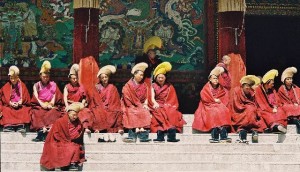 I am standing in the dust motes revealed by the sun at the door of the dark prayer hall poised with my slip of paper in elegant Tibetan script. Is a person so full of false pride such as I in need of prayer? Before I can answer this question, I throw pride into the air along with the prayer. What is left are prayers prayed for me… and, to my surprise, my own laughter. I walk away in high spirits thinking that this prayer of lighthearted good wishes will surely blow on the wind and accompany me as I go. Like most moments, it is not profound or extraordinary in any way… but a rare simple-minded moment of laughter that grows out of a silly misunderstood circumstance. It means more to me than anything that could possibly touch the deepest part of me… and, for a long time afterward, I take that laughter with me everywhere and find myself smiling in the oddest places.
I am standing in the dust motes revealed by the sun at the door of the dark prayer hall poised with my slip of paper in elegant Tibetan script. Is a person so full of false pride such as I in need of prayer? Before I can answer this question, I throw pride into the air along with the prayer. What is left are prayers prayed for me… and, to my surprise, my own laughter. I walk away in high spirits thinking that this prayer of lighthearted good wishes will surely blow on the wind and accompany me as I go. Like most moments, it is not profound or extraordinary in any way… but a rare simple-minded moment of laughter that grows out of a silly misunderstood circumstance. It means more to me than anything that could possibly touch the deepest part of me… and, for a long time afterward, I take that laughter with me everywhere and find myself smiling in the oddest places.


